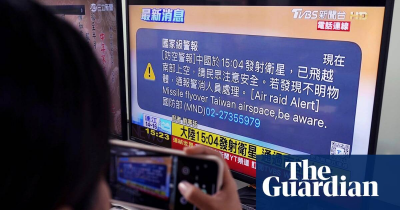The Guardian-Chinese satellite launch triggers emergency alert across Taiwan
January 9, 2024 4 min 690 words
这则报道揭示了中国卫星发射引发台湾全境紧急警报的一幕,令人不禁思考其中的政治复杂性。在台湾总统选举前夕,由于消息中“卫星”错误翻译为“导弹”,引发了全国性的惊慌和混乱。这不仅揭示了翻译问题可能带来的后果,还凸显了中台紧张关系的敏感性。中国未提前通报卫星发射,进一步加剧了台湾的紧张情绪。报道中反映的对于选举前夕采取类似行动的不安感是现实的政治背景,北京对台湾的威胁和军事压力在选举中不断加剧。然而,台湾国防部后来澄清了消息,表示发射对象是卫星而非导弹。此事件凸显了两岸关系的脆弱性,需要更为谨慎和透明的沟通来避免引发误解和紧张。
A Chinese satellite launch triggered a nationwide emergency alert in Taiwan on Tuesday just days before its presidential election, prompting some alarm and confusion as the English portion of the message erroneously translated satellite to “missile”.
The bilingual air raid alert blasted over loudspeakers and was sent to every mobile phone in Taiwan shortly after 3pm local time (0700 GMT), warning people to “be aware”. The message said in Chinese that China had launched a satellite at 3.04pm and it had flown over the southern part of Taiwan. The English portion said “[air raid alert] missile flyover Taiwan airspace”.
At about the same time Chinese media reported the successful launch of a scientific satellite, known as the Einstein probe, from the Xichang launch centre in Sichuan province. Trajectories posted by military observers online showed it flying south-east of Taiwan’s most southern point at high altitude.
Chinese authorities had not given notice of the launch.
The launch and alert came at a moment of anxiety in Taiwan, where presidential elections will take place on Saturday, under threat from Beijing which claims it as a province and threatens to annex it.
The election, like all previous ones since Taiwan democratised in the late 1980s, has been targeted by Beijing with military intimidation, cognitive warfare and economic coercion in an effort to get people to vote for its preferred candidate. In recent years there has been increased military aggression including missiles shot over Taiwan during live-fire exercises.
Taiwan’s defence ministry later confirmed it was a satellite, not a missile, and apologised for what it said was an oversight in the English language used in the alert. “The wording of the original system was not updated to accurately express that the launched object was a satellite rather than a missile.”
Taiwan’s foreign minister, Joseph Wu, said launching the satellite over Taiwanese airspace so close to the election was a “grey zone” activity, putting it in the same category as China’s military flights into Taiwan’s air defence identification zone and a recent run of Chinese weather balloons flying over Taiwan.
“All these kinds of tactics … remind people here in Taiwan that there is a danger of war,” he said. “With these kinds of threats against Taiwan I think we should be clear-eyed, and not be provoked.”
Opposition parties accused the Taiwan government and defence ministry of fearmongering. A legislator for the opposition Kuomintang party, Ling Tao, said there were no emergency alerts during previous satellite launches, or when actual missiles were launched during the 2022 People’s Liberation Army drills held in retaliation to the then US speaker, Nancy Pelosi, visiting Taiwan. Ling questioned if the ruling Democratic Progressive party was “using the CCP [Chinese Communist party] to intimidate people”.
The Guardian has contacted Taiwan’s defence ministry for further clarification about why this particular launch triggered an emergency alert.
The Chinese portion of the text also prompted some confusion and bemusement, with “flying over the south part” sharing some characters with “Vietnam”, and leading people to think the satellite was much further away.
A popular social media page ran a poll asking if people read “Vietnam” or were “too scared to see anything clearly”. More than 85% of people said they read “Vietnam”. The supermarket chain Carrefour quickly posted an advertisement on Facebook, writing: Alert! Did you also read the message wrong? Let’s drink some Vietnamese coffee in the afternoon to wake up.”
The incident also prompted unusual Twitter activity, with dozens of accounts all tweeting “looks like a false alarm, but a lot of people were scared”. Most of the accounts were created in May 2023 and had few followers.
Wu was also among those who initially misread the message. The alert sounded in the middle of a press conference being held by the foreign minister for hundreds of mostly English-speaking foreign media in Taiwan to cover the election. Reading the alert on a phone screen, Wu initially told the crowd it was a satellite launch that flew over Vietnam, and was nothing to worry about.
Additional reporting by Amy Hawkins and Chi Hui Lin

